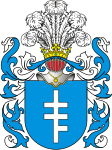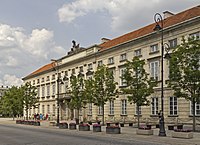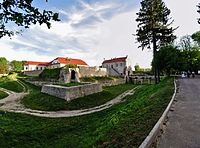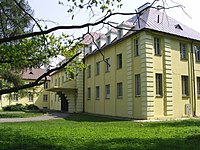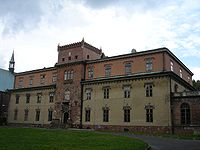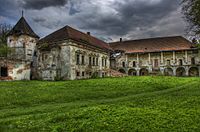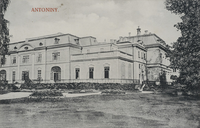Potocki family
This article needs additional citations for verification. (May 2017) |
| Potocki | |
|---|---|
 | |
| Country | Poland |
| Founded | Officially in 15th century |
| Founder | Jakub Potocki (c. 1481-1551) |
| Titles | Hetmans Primates of Poland Magnates Nobles |
| Estate(s) | Poland, Lithuania, Ukraine, Belarus |
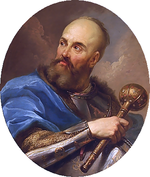






Potocki (Polish pronunciation: [pɔˈtɔt͡skʲi], plural Potoccy) was one of the prominent Polish noble families in the Kingdom of Poland and magnates of the Polish-Lithuanian Commonwealth. The Potocki family is one of the wealthiest and most powerful aristocratic families that still exist in Poland.
History
The Potocki family originated from Potok in the Kraków Voivodeship; their family name derives from that place name. The family contributed to the cultural development and history of Poland's Eastern Borderlands (today Western Ukraine). The family is renowned for numerous Polish statesmen, military leaders, and cultural activists.
The first known Potocki was Żyrosław z Potoka (born about 1136). The children of his son Aleksander (~1167) castelan of Sandomierz, were progenitors of new noble families such as the Moskorzewskis, Stanisławskis, Tworowskis, Borkowskis, and Stosłowskis. Jakub Potocki (c. 1481-1551) was the progenitor of the magnate line of the Potocki family, with descendants living today, including those living in America.[citation needed]
The magnate line split into three primary lineages, called:
- "Linia hetmańska" ("Srebrna Pilawa"), in English: "Hetman's lineage" ("Silver Pilawa"). Note some sources refer to Pilawa as Piława.
- "Linia Prymasowa" ("Złota Pilawa"), in English: "Primate's lineage" ("Golden Pilawa")
- "Żelazna Pilawa", considered the oldest ones, in English: "Iron Pilawa"
The "Złota Pilawa" line received the title of count from the Emperor of the Holy Roman Empire in 1606. The entire family began using the Count title after the partitions of Poland. The title was recognized 1777 and 1784 in the Kingdom of Galicia and Lodomeria and 1838, 1843, 1859, 1890 1903 in Russia and 1889 by the Pope and in the Kingdom of Poland (Congress Poland).
In 1631 Stefan Potocki, who started the "Złota Pilawa" lineage, died and was buried in Zolotyi Potik (pl. Złoty Potok, Golden Potok, a village owned by this lineage), his descendants started to use the Pilawa coat of arms in golden colour. Because of that the lineage is called the "Złota Pilawa" (Golden Piława).
There are also four branches called:
- "Gałąź łańcucka" (Branch of Łańcut)
- "Gałąź krzeszowicka" (Branch of Krzeszowice)
- "Gałąź tulczyńska" (Branch of Tulczyn)
- "Gałąź wilanowska" (branch of Wilanów)
Named after the hubs of their respective constellations of properties.
The family became prominent in the 16th and 17th centuries as a result of the patronage of Chancellor Jan Zamoyski and King Sigismund III Vasa.
Notable family members
- Aleksander Stanisław Potocki (1778–1845), landowner, politician
- Alfred Józef Potocki (1817–1889), Sejm Marshal, Minister-President of Austria
- Alfred Wojciech Potocki (1785–1862), landowner, politician
- Andrzej Potocki (?-1692), Field Crown Hetman
- Andrzej Potocki (1618–1663), Obozny and voivode
- Teodor Potocki (1664–1738), Primate of Poland and interrex in 1733
- Antoni Protazy Potocki (1761–1801), banker and voivode
- Artur Potocki (1787–1832), landowner, officer
- Ewa Józefina Julia Potocka (1818–1895), married to Prince Franz de Paula of Liechtenstein
- Feliks Kazimierz Potocki (1630–1702), Field and Great Hetman of the Crown
- Franciszek Salezy Potocki (1700–1772), Krajczy, Field Clerk of the Crown
- Jan Potocki (1761–1815), writer (The Manuscript Found in Saragossa)
- Jerzy Józef Potocki (1889–1961), diplomat, officer
- Józef Potocki (1673–1751), Great Hetman of the Crown
- Józef Potocki (?-1723), Great Guard of the Crown
- Katarzyna Potocka (?-1642), was married to Janusz Radziwiłł
- Konstancja Potocka (1781–1852), was married to Jan Potocki and Edward Raczyński
- Mikołaj Potocki (1595–1651), Field and Great Crown Hetman
- Mikołaj Bazyli Potocki (1712–1782), Starost of Kaniv, benefactor of the Pochayiv Lavra
- Natalia Potocka (1810–1830), was married to Roman Sanguszko
- Roman Ignacy Potocki (1750–1809), co-author of the Polish Constitution of May 3, 1791
- Roman Potocki (1851–1889), landowner
- Seweryn Potocki (1762–1829), curator of Kharkov educational district in Russian Empire[1]
- Stanisław Kostka Potocki (1755–1821), writer, publicist, collector and patron of art
- Stanisław "Rewera" Potocki (1579–1667), Field and Great Hetman of the Crown
- Stanisław Potocki (1659–1683), starost of Halicz and Kołomyja, rotmistrz and pułkownik of cavalry
- Stanisław Szczęsny Potocki (1753–1805), Marshal of the Targowica Confederation
- Stefan Potocki, starosta of Fellin
- Stefan Potocki, starosta of Nizhyn
- Stefan Aleksander Potocki, the founder of the Basilian Buchach basilian monastery
- Wiktoria Elżbieta Potocka (died c. 1670), was married to Adam Hieronim Sieniawski and Andrzej Potocki
Other relatives
- Count Geoffrey Potocki de Montalk (1902–1997), an accomplished New Zealand poet, has been erroneously described as a "feigned member" of the Pilawa Potocki family. In fact, he is a direct descendant of the Bocki Potocki line, until recently believed to have died out with the death of Count Jozef Franciszek Jan Potocki, his great grandfather, in Paris. Jozef's son, Count Joseph Wladislas Edmond Potocki de Montalk, born in Paris in 1836, B. es L. (Sorbonne), fought in Garibaldi's campaign of 1859 and arrived in New Zealand in 1868, where he became Professor of Modern Languages at Auckland University College. He was the author of The Elements of French Literature, 1879; founder and president of the Alliance Française; a member of the Société de Linguistique de Paris; and, as an Officier d'Académie, was a recipient of the Palmes académiques. Professor Potocki de Montalk had twelve children; the eldest son, Robert Wladislas, an Auckland architect, was Geoffrey Potocki de Montalk's father.
Coat of arms and motto
The Potocki family used the Piława coat of arms, and their motto was Scutum opponebat scuto (Latin for "Shield opposing shield"; literally "He opposed shield to shield").
-
Silver Pilawa
-
Golden Pilawa
-
Arms of the Counts Potocki
-
Pilawa at the Potocki mausoleum at Wilanów Park
-
Pilawa at Leżajsk monastery
Palaces and parks
-
Palace "Pod Baranami" in Kraków
-
Palace of Szczęsny Potocki in Tulczyn
-
Potocki Palace in Radzyń Podlaski
-
Zbarski Palace in Kraków
-
Tyszkiewicz Palace, Warsaw
-
Palace in Natolin
-
The Potocki mausoleum at Wilanów Park at Warsaw
-
Palace in w Krystynopol
-
Potocki's Palace in Międzyrzec Podlaski
-
Castle in w Zator
-
Palace in Będlewo
-
Palace of Adam Józef Potocki in Krzeszowice
-
Palace Chrząstow (Koniecpol)
-
Palace in Nemyriv
-
Palace in Vysokaye
-
Palace in Antoniny (Khmelnytskyi Oblast)
-
Ruins of a castle from the 17th century in Zolotyi Potik
See also
- Potocki Palace, several palaces associated with the Potocki family
- Pochayiv Lavra
- Piława Coat of Arms
Further reading
- Potocka-Wąsowiczowa, Anna z Tyszkiewiczów. Wspomnienia naocznego świadka. Warszawa: Państwowy Instytut Wydawniczy, 1965.
References
- ^ Petronis, Vytautas (2007). Constructing Lithuania: Ethnic Mapping in Tsarist Russia, ca. 1800-1914. Stockholm University Press. p. 95.

